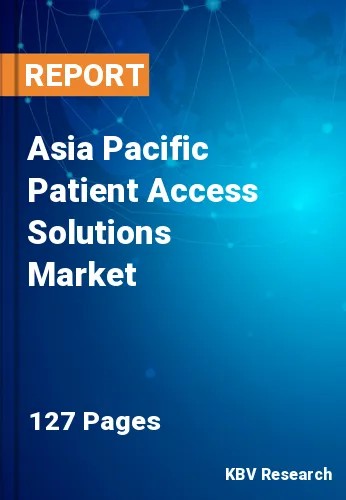The Asia Pacific Patient Access Solutions Market would witness market growth of 9.6% CAGR during the forecast period (2022-2028).
The goal of "patient access" in all of its guises is to bridge the gap between the patient and the many components of the healthcare system. When assessing and analyzing healthcare news and trends, life science information, regulatory, and competitive intelligence experts should consider these factors. These factors include insurance, physicians, facilities, health records, clinical care, and treatments. Any health organization or system should start by putting in place a system for tracking and measuring patient workflow and access. This implies that one should be aware of the typical wait time for a patient to schedule an appointment at a facility or institution.
Users can accomplish this for smaller practices by keeping a monthly journal and noting open appointments as they come available. Anyone can examine the data points and observe the variation in appointment availability after collecting data for a month. Monitoring the number of cancellations, rescheduling, no-shows, and appointment denials practice experiences is also crucial. While the majority of healthcare organizations and systems can accomplish this with their current EHR software, some require a more powerful platform that can provide in-depth analytics and real-time updates on patient care.
A prediction has been made regarding the new health issues that India is going to experience during the following several decades. Based on a statistical model that calculates the change in DALYs applied to the population predictions for 2020 and vice versa, Murry and Lopez (Word Bank B 2000) have offered a potential situation of the burden of disease (BOD) for India in the year 2020. The important findings must be interpreted while bearing in mind that the idea of DALYs encompasses not just mortality but also disability as measured by the number of healthy years of life lost. According to this prediction, DALYs will significantly decline in respiratory infections and diarrheal diseases, but less significantly in maternal disorders. The growing cases of diseases drive the growth of the patient access solution market for this reason.
The China market dominated the Asia Pacific Patient Access Solutions Market by Country in 2021, and would continue to be a dominant market till 2028; thereby, achieving a market value of $273.5 million by 2028. The Japan market is exhibiting a CAGR of 9% during (2022 - 2028). Additionally, The India market would experience a CAGR of 10.3% during (2022 - 2028).
Based on Offering, the market is segmented into Services and Software. Based on Software Type, the market is segmented into Eligibility Verification Software, Medical Necessity Management Software, Precertification & Authorization Software, Claims Denial & Appeal Management, Payment Estimation Software and Claims Payment Assessment, Processing Software & Others. Based on Deployment Mode, the market is segmented into Web & Cloud-based Solutions and On-premises. Based on End User, the market is segmented into Healthcare Providers, HCIT Outsourcing Companies and Others. Based on countries, the market is segmented into China, Japan, India, South Korea, Singapore, Malaysia, and Rest of Asia Pacific.
Free Valuable Insights: The Worldwide Patient Access Solutions Market is Projected to reach USD 3.3 Billion by 2028, at a CAGR of 9.1%
The market research report covers the analysis of key stake holders of the market. Key companies profiled in the report include UnitedHealth Group, Inc. (Optum, Inc.), Cognizant Technology Solutions Corporation, McKesson Corporation, Oracle Corporation (Cerner Corporation), Experian PLC, 3M Company, Epic Systems Corporation, AllScripts Healthcare Solutions, Inc., F. Hoffmann-La Roche Ltd. (Genentech, Inc.), and Tenet Healthcare Corporation (Conifer Health Solutions, LLC).
By Offering
By Deployment Mode
By End User
By Country
Our team of dedicated experts can provide you with attractive expansion opportunities for your business.

